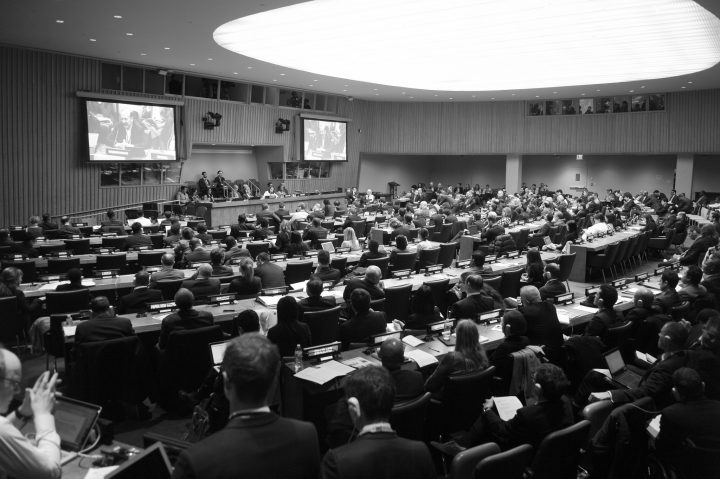More than 120 countries have been participating in talks to negotiate a treaty prohibiting nuclear weapons since Monday March 27th in the UN headquarters in New York. While the nuclear weapons states and their allies are not in the room, the proponents of the ban treaty are counting on the delegitimisation effects of the treaty to drive the world toward the total elimination of nuclear weapons.
On the three first days of this first session, that will last until Friday, delegates expressed their will to anchor the treaty and its preamble in the humanitarian considerations that have been the driving force behind these negotiations, and confirmed their conviction that there is the need to fill a legal gap: nuclear weapons are the only weapons of mass destruction which are not yet prohibited by law.
“This is an historical moment, the negotiations are focussing on a legally binding instrument to prohibit nuclear weapons and lead toward their total elimination,” said Co-President of the International Peace Bureau, Reiner Braun. “This is what the vast majority of peoples have been seeking for years, and we must make sure the treaty opens the door to elimination.” Civil society representatives, experts and survivors of the atomic bombings have been contributing to the debate, reflecting on the role that they have played to start these negotiations.
As was well expressed today by the Ambassador of Trinidad and Tobago, the feeling in the room is very serious and committed: “We are standing on the precipice of history as we seek to shatter the chronic stalemate that has existed in the field of nuclear disarmament and non-proliferation for far too long.” While the ghosts of the nuclear weapons states and their allies are haunting the room, participants seem convinced that a ban treaty will change the game, provide a strong tool for public opinion to pressure their governments and open eyes to the dangers of an accidental or intentional detonation that will occur if nuclear weapons are kept for ever.
Indeed, experts are now convinced that the question about the next nuclear detonation is not “if”, but “when”, as new studies and declassified documents show the vulnerabilities of the whole nuclear infrastructure. “An efficient ban treaty is absolutely needed,” stressed Mr Braun, “and if we want if to be effective in changing the policies and practices of nuclear-armed and nuclear-reliant states, the treaty must prohibit all the activities that enable all current policies and practices. It must be simple, clear, efficient and goal-oriented”.
This week should provide clear grounds for the president of the conference, Mrs Elayne Whyte Gómez from Costa Rica, to present a draft treaty before the next and last round of negotiations from June 15 to July 7th. Civil society is already calling for a global day of demonstrations on July 17 led by women’s organisations to demonstrate the strong commitment to ban nuclear weapons and free the world from the threat of nuclear weapons.






